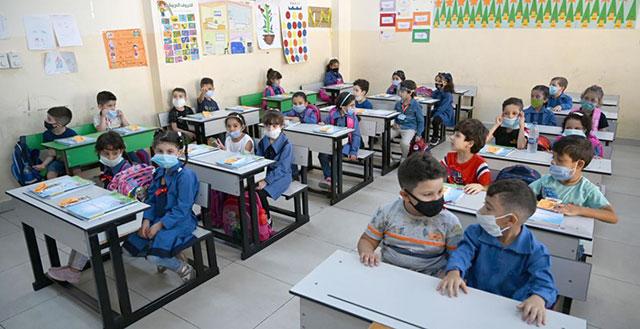You are here
Helping or hurting: Reflections on distance learning
By Sarah Nabulsi , Family Flavours - Jun 28,2020 - Last updated at Jun 28,2020

Photo courtesy of Family Flavours magazine
Since the coronavirus outbreak in March this year, online distance learning has become the cornerstone of education in Jordan. How well have students, parents and educators coped and adapted? Al Marji’ Publications recently convened a virtual panel discussion to find out. You can visit Al Marji’ Publications’ YouTube channel to view the webinar.
Meet our panelists
Educator: Haifa Najjar — senator and superintendent of two private schools in Amman. Najjar is also head of the Technical Committee of the Queen Rania Award for Excellence in Education, a member of the Senate’s Education Committee, a member of the National Committee of the Higher Council for Curriculum Development and elected member of the European Council of International Schools.
Educator: Dina Halaseh — educational psychologist and specialist in the field of brain development and training.
Parent: Sawsan Dalaq — director of The Children’s Museum Jordan, member of the Parent-Teacher Association (PTA) at a private school and mother of two.
Parent: Dina Halaseh — educational Psychologist and specialist in the field of brain development and training.
Parent: Ra’ad Jumean — design Strategist, managing director of an interior design firm and father of two. Parent: Rawan Nazer — pharmacist and mother of three.
Students: Laith Abu Rub (11th grader), Hala Shahatit (7th grader) and Mazen Saleh (9th grader).
What students
are saying
Ninth grader Saleh enjoys waking up later and working on a laptop from the comfort of his bed or on the sofa instead of being in a classroom. “I feel as though I can learn the material at my own pace and on my own time, with breaks when I need them,” he explains. But he admits to missing his friends, teachers and extracurricular activities and says educators have not been mindful of cyberbullying.
For 7th grader Shahatit, distance learning has meant new opportunities that she doesn’t get in a traditional classroom. The chat box on her online learning platform allows her and everyone in the class to ask and answer questions. She also benefits from teachers recording lessons. “When I don’t understand something, I can go back to the recording to better prepare myself for the next class,” she says.
Eleventh grader Abu Rub also appreciates recorded classes. As a student applying to universities, he believes the COVID-19 era of education will make test scores less important and that he will need to put more effort this coming academic year into his extracurricular activities, essays and interviews.
Students recount other challenges, such as increased workload with distance learning, getting easily distracted as well as difficulty in staying motivated. As peer-to-peer interaction is also a pivotal part of education, for our student panellists, it feels like it falls short in their distance learning. Even for those who use Zoom, Microsoft Teams or Google Meet, students are often muted or their cameras are off. Thought-provoking discussions don’t happen online like they do at a physical school, the students agreed.
The experience of younger children
Online learning is not an ideal medium, for younger children in particular, notes Najjar. Most primary-aged students had no previous experience with online learning tools before COVID-19 and parents are struggling to keep their children focused on schoolwork. Jumean, a father of two, points out that it is hard to convince his seven-year-old that he is not on an extended vacation. Everybody needs built-in breaks, which include fresh air and physical activity, adds Halaseh. Najjar also stresses that for younger children, learning through play is still crucial.
As these times are confusing and stressful for both children and adults, Jumean has found that his child, as well as himself and his working spouse, cannot realistically commit continuously to set routines. Najjar says it’s reasonable to feel frustration and uncertainty as fathers and mothers are thrust into the parent-teacher role. Everyone, from students to parents and teachers, is on a learning journey together, she adds.
Challenges and benefits for parents
Whether they have children in elementary or high school, our parent panellists share many of the same pains: establishing a daily routine, keeping their children focused on schoolwork, balancing household responsibilities and teaching, balancing working from home and teaching or supervising their children’s learning as well as reducing anxiety due to real-world concerns about the virus.
Nazer, who lives in Dubai, describes the difficulty of managing different aged children in a remote learning environment. When she found herself unable to go back to Dubai after a trip to Amman, due to the lockdown, she had to secure “a computer device for each child, ensure Internet connection was strong and create a learning environment with minimal distractions”.
In this context, Najjar points out, “Many parents have children of different ages, each with their own learning needs.” Education, whatever its form, needs to be flexible in its ability to cater to individual student needs and accommodate individual learning styles, she adds.
However, as Halaseh points out, “not all schools managed to accommodate for exceptional students, special needs and gifted students”.
Yet, parents also acknowledge how distance education can help better understand their children’s learning abilities, styles and preferences. Nazer and Dalaq benefited from seeing firsthand how their children manage school and engage with their learning.
Well-being and connection
Halaseh sees the added stress that distance education places on everyone, affecting the mental and physical health of students, parents and teachers. “Human beings are not made for lengthy isolation. Online learning, for the most part, lacks peer interaction and knowledge sharing,” she adds.
Dalaq recognises the importance of the human element when her daughter asked about “why some teachers keep their camera turned off”. Dalaq says that while the entire school community has worked hard to make the transition to distance learning smoother, “we need to be more prepared for the non-academic side”. Panellists agree that students need a sense of being cared about by their teachers and this feeling can dramatically improve their motivation to learn.
The people who most want to return to school may not be only the students but also the teachers. Najjar explains that teaching online can be more challenging than most people would imagine, and can lead to high levels of stress. Teachers struggle with feeling anxious and overwhelmed. They divide their time between supporting their children and teaching their students, putting in longer hours than usual for distance education. Whatever the platform, the delivery of instruction is challenging, especially as many teachers try to keep up with the pace of the in-school curriculum.
Beyond academics
Going to school is not only about learning core subjects, but also about social relationships, peer-to-peer interactions and learning to be a global citizen, panellists stress. “Students are curious and they should be able to feed their curiosity by exploring and interacting with the world outside the walls of their homes,” says Najjar.
“A teacher helps to ignite students’ dreams, unleash their potential and nurture critical thinking, communication skills, teamwork and human caring,” Najjar concludes.
The COVID-19 pandemic has been destructive and disruptive in so many ways for billions of people, but it has also equipped students, parents and teachers for future learning and communication. As everyone hopes to see a return to schools in August or September, one thing is sure: there’s a growing appreciation from students and parents for what teachers do in the classroom year-round. Teachers deserve recognition and gratitude more than ever.
Tips from Halaseh
Here are ways parents may support their children’s transition back to school after a long period of distance learning:
•Creating a routine and schedule: Jointly set a fixed time for everything, even playing, reading, eating, waking up and sleeping. Children need a daily routine and schedule to thrive
•Work on creating a growth mindset: This requires instilling in your children the ability to focus on the process and not just the result. Children should not fear mistakes; instead they should want to learn and discover
•Avoiding comparisons: Don’t stress the knowledge gap between your child and another. This extra stress will only reflect negatively on you and your family.
•Focusing on a healthy brain and lifestyle: Healthy eating, exercising, sleeping and brain training are important areas to focus on! Don’t forget, no extra sugar or caffeine!
•Modelling what you want your kids to do: Children tend to copy what parents do, so check your own behaviours and stress level and see what you need to work on
Reprinted with permission from Family Flavours magazine
Related Articles
AMMAN — The government decision to continue with remote learning for school children have drawn ire from parents, teachers and student
AMMAN — The government’s decision to suspend in-class education to curb the spread of the coronavirus has evoked mixed reactions from parent
AMMAN — Going back to school amid the pandemic has provoked a mix of emotions from parents, teachers and students.A group of Jordanan mother















